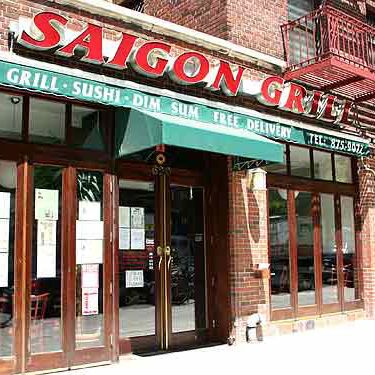
An unending saga of labor-related lawsuits and a voluminous associated history of workers’ rights protests against Saigon Grill on the Upper West Side took another mysterious turn last week when the popular Vietnamese eatery shut down without warning, leaving only a cryptic note behind in its window to mark the closure and an outgoing phone message — presumably recorded by owners Qiao Lin and Bei Lin — announcing that they hope to be “coming back soon.” Other than that, no one quite knows what exactly has happened on Amsterdam Avenue.
“I don’t know why they left. I have absolutely no information,” says Debra Bodian Bernstein, a lawyer who represented the Lins in a civil lawsuit brought on by 38 former Saigon Grill delivery workers, who sued for back wages and overtime owed to them by the restaurant’s previous owners Simon and Michelle Nget.
The restaurant’s most recent legal issues once again kicked into gear on February 8, when the New York State Supreme Court Judge Marcy Friedman ruled that the Lins and two other parties were required to pay $1 million, plus interest, based on a promissory note made in 2009 stating that the Lins would assume the back wages as debt, as part of their deal in purchasing the restaurant from the Ngets for $1,500,000. (The Lins paid $500,000, a source tells Grub Street, but have disputed payment of the remaining $1 million.).
Saigon Grill has a long and complicated history of mistreating workers, who since 2007 have initiated a series of lawsuits that have protested the restaurant with such tenacity that activists have even created Twitter accounts and blogs to explain how workers were wronged by their former employer. Complicating matters was the arrest of the Ngets in 2008 for payroll fraud and evidence tampering; the Ngets had been required to pay the delivery workers $4.6 million in back wages and overtime, and the sum was later reduced after negotiations.
Bernstein claimed in court last month that the Lins were unaware that workers were allegedly required to make “illegal deductions” from their recovered wages to the Chinese Staff and Workers Association, the workers’ rights and advocacy group. She described the alleged arrangement as a deal that violated anti-kickback statutes, a charge that the judge dismissed.
Another lawyer, Eric Su, who previously represented the Saigon Grill, did not respond to requests for comment today, but previously told Grub Street that the Lins had suffered financial losses because the Chinese Staff and Workers Association and 318 Restaurant Workers Union organized a formidable boycott against the restaurant. “I’m familiar with the judgment but really have no response,” he said, stating that the two years of picketers outside the Upper West Side restaurant had damaged its profitability. “[The Lins] agreed to pay,” said Su. “But they did not know that the labor organization would stand to collect one third of the million dollars.”
William C. Rand is yet another lawyer with knowledge of the situation; he represents two employees at the Saigon Grill on the UWS and is appealing the ruling of a federal judge who dismissed his complaint last year against the Chinese Staff and the 318 Restaurant Workers Union, claiming that his clients were required to pay the groups “kickbacks” in the form of “donations” once they received their recovered wages. Rand said he was also attempting to create a “putative class action” of the other 38 workers against the two groups, who could “join or not,” he said, and would seek restitution.
Wing Lam, executive director of the Chinese Staff and Workers Association named in Rand’s complaint, denied that his group pressures members to pay donations in exchange for representation from allegedly pro bono lawyers, who in turn prosecute employers for abusive labor practices. “Chinese Staff is a public support organization,” he said. “You can donate money. But we never force anyone to donate money. We help workers. Sometimes we even lend them money.”
Lam identified the two Saigon Grill employers in Rand’s complaint as “shareholders” in the restaurant who turned against his group because “They’re greedy,” he said. When asked about the Lins, Lam says he believes they continued their exploitative labor practices of the Ngets and never had any intention of paying the workers. “Why don’t they do the right thing?” He asks. “They had two years to pay. Now they’re trying to skip out.”
Earlier: Saigon Grill Workers Get $4.6 Million Payday
Earlier: Saigon Grill Protests Heat Up Again Under New Owners




